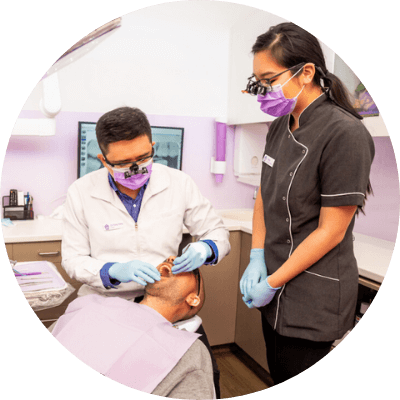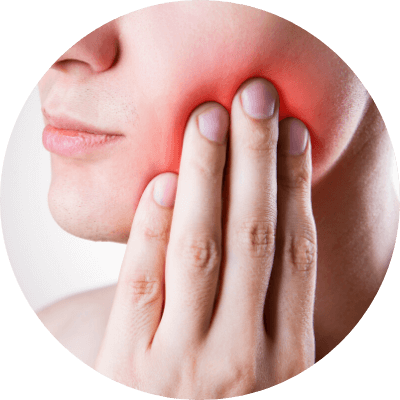Periodontal Disease: Causes and Prevention
Periodontal Disease: Causes and Prevention
What Is It?
Periodontitis is a term used to describe a group of conditions that involves inflammation of the gums and other structures that support the teeth. Periodontitis is caused by bacteria found in dental plaque and generally starts as gingivitis.
In trying to eliminate the bacterial infection, your body produces substances that destroy the structures that hold the teeth in the jaw, including the periodontal ligament and underlying bone. As this process continues, the teeth become loose. Pockets form between the teeth and gums, allowing more bacteria to accumulate. Left untreated, periodontitis can result in tooth loss.
Periodontitis usually is relatively painless. The onset of significant pain may signal the development of an abscess.
Older adults are more likely to have periodontitis.
People who smoke are four to seven times more likely than nonsmokers to get periodontitis. Smoking may impair the body’s defense against bacteria.
Symptoms
Symptoms may include:
- Reddened, swollen or bleeding gums
- Receding gums
- Loose Teeth
- Bad breath
- An unpleasant taste in the mouth
However, many people are unaware of symptoms or do not believe they are signs of a serious problem, especially in the early stages of the disease.
Diagnosis
Your dental professional will examine your mouth, paying special attention to your gums and teeth. If you have periodontitis, a dental probe inserted between your tooth and your gums will penetrate deeper than it normally would.
Your dental professional may also test for loose teeth. Teeth have a normal range of mobility, but in people with periodontitis, the teeth are looser due to the destruction of the fibres and bone supporting the teeth.
Your dental professional may also order X-rays to help diagnose periodontitis. These can be compared with older X-rays to see if changes have occurred in your teeth and gums.
Expected Duration
Unlike gingivitis, periodontitis cannot be completely reversed. In some situations, the supporting fibres and bone that have been lost can be regenerated. In most cases, however, particularly in advanced stages of the disease, the effects are permanent. However, treatment and improved oral hygiene at any stage can improve the health of your gums and prevent further destruction.
Prevention
Daily brushing and flossing (morning and night) and regular visits for professional cleaning can help prevent periodontitis or allow you to have it treated during its earliest stages. If you smoke, quitting will reduce your risk significantly.
Treatment
Treatment depends on how severe your periodontitis is. The disease can be classified as mild, moderate or severe.
Mild periodontitis is usually treated first with a thorough cleaning called scaling and root planing. Scaling removes plaque or calculus that has accumulated on the crowns of your teeth (the parts that show) and slightly below the gum line. Root planing removes plaque or calculus from the roots of your teeth. This, combined with good oral hygiene at home, often is enough for successful treatment.
Moderate periodontitis may require more than scaling and root planing. Typically your dentist or periodontist will scale and root-plane your teeth. If this does not take care of the problem, he or she may discuss the need for surgical treatment with you. Surgery can involve raising flaps to expose root surfaces for a more thorough cleaning, reshaping the gums to fit the teeth (resective surgeries) or encouraging lost bone to regrow (regenerative surgeries). Your dentist or periodontist will explain your options and help decide the best course of action.
Severe periodontitis likely will require surgical intervention and, in some instances, antibiotics. At this stage of disease, tooth loss is a distinct possibility.
No matter which treatment you undergo, you should start a strict regimen of brushing and flossing to help restore your teeth to health.
When To Call a Professional
The best course of action is to get regular dental checkups. If you have persistent bleeding or swelling of your gums or notice loose teeth, call your dentist straight away.
Prognosis
The outlook is good if the disease is recognized early and treated thoroughly. Once bone loss occurs, the prognosis depends on the severity of the loss. Quitting smoking is very important for periodontal therapy to be successful. Lifelong maintenance will be required once the disease is controlled.
To read the original article, click here.
DISCLAIMER:
The content has been made available for informational and educational purposes only. Dental House Group does not make any representation or warranties with respect to the accuracy, applicability, fitness, or completeness of the content.
The content is not intended to be a substitute for professional personal diagnosis or treatment. Always seek the advice of your dentist or another qualified health provider with any questions you may have regarding a dental or medical condition. Never disregard professional advice or delay seeking it because of something you have read or seen on the Site.
Services we mentioned:
More Dental Articles
Dental Hygiene for Plaque and Tartar
Two important dental hygiene issues are plaque and tartar control. Patients often confuse plaque and tartar and how they’re related to eac…
Dental Trauma and First Aid
“Accidents happen” is one of those phrases we casually throw around without thinking. But the reality is that accidents can have quite seri…
Healthy Juices Might Not Be so Good for Your Teeth
You probably know all about tooth decay and dental cavities — and that sugar feeds the bacteria that causes the decay. The effects of acid o..
Family Guide to Oral Health
By following the information in this guide, you and your family can aim to have healthy teeth and gums to last a lifetime. As a parent, you…
















